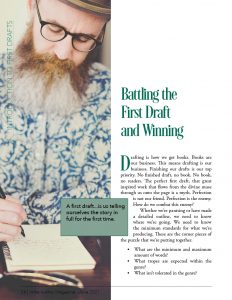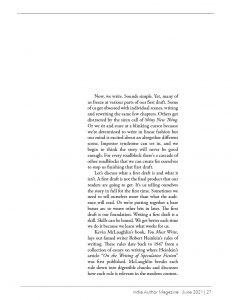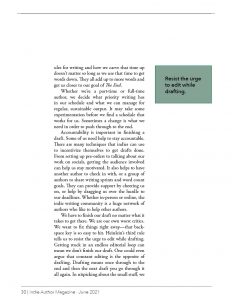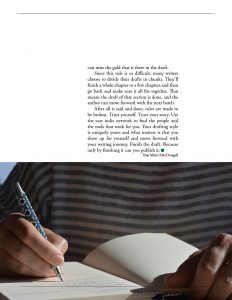
Drafting is how we get books. Books are our business. This means drafting is our business.
Finishing our drafts is our top priority. No finished draft, no book. No book, no readers. The perfect first draft, that great inspired work that flows from the divine muse through us onto the page is a myth.
Perfection is not our friend. Perfection is the enemy.
How do we combat this enemy? Whether we’re pantsing or have made a detailed outline, we need to know where we’re going. We need to know the minimum standards for what we’re producing. These are the corner pieces of the puzzle that we're putting together.
- What are the minimum and maximum amount of words?
- What tropes are expected within the genre?
- What isn’t tolerated in the genre?
Now, we write. Sounds simple. Yet, many of us freeze at various parts of our first draft. Some of us get obsessed with individual scenes, writing and rewriting the same few chapters. Others get distracted by the siren call of Shiny New Thing. Or we sit and stare at a blinking cursor because we’re determined to write in linear fashion but our mind is excited about an altogether different scene.
Imposter syndrome can set in, and we begin to think the story will never be good enough. For every roadblock there’s a cascade of other roadblocks that we can create for ourselves to stop us finishing that first draft.
Let’s discuss what a first draft is and what it isn’t. A first draft is not the final product that our readers are going to get.
It’s us telling ourselves the story in full for the first time.
Sometimes we need to tell ourselves more than what the audience will read. Or we’re putting together a bare-bones arc to weave other bits in later. The first draft is our foundation.
Writing a first draft is a skill.
Skills can be honed. We get better each time we do it because we learn what works for us.
Kevin McLaughlin’s book, You Must Write, lays out famed writer Robert Heinlein’s rules of writing. These rules date back to 1947 from a collection of essays on writing where Heinlein’s article “On the Writing of Speculative Fiction” was first published. McLaughlin breaks each rule down into digestible chunks and discusses how each rule is relevant in the modern context.
Heinlein’s rules are :
- You must write.
- You must finish what you start.
- You must refrain from rewriting except to editorial order.
- You must put it on the market.
- You must keep it on the market until it’s sold.
For the purposes of drafting, only the first three rules are relevant to us. We know we must write. Many of us have been scribbling in margins and daydreaming stories our whole lives, as writing is at the core of our beings.
Focusing our writing is where we falter. Writing one story with a beginning, middle, and end can be a roller coaster of revelations and frustrations.
Most of us have one story in us that we’ve been harboring for years trying to figure out how to tell it. Sitting down and deciding which story is ready to be told requires us to face our ego.
McLaughlin’s advice is that the tools we use, the speed we write, and even the market itself don’t matter in the drafting process. We need to write. There’s all kinds of organizational tools and apps to help with schedules. You can even gamify your word counts. We can use whatever tools we like to help us. If a tool doesn’t work, don’t use it. Tools are personal, we all have our preferences and those can change over time. Whether it’s Scrivener or Google docs, at the end of the day we choose the tool that helps us get our words done.
It’s shocking to think that the market doesn’t matter when we write a draft. We have to remember that the first draft is not what’s going to the market. The draft is us telling ourselves the story. It can be messy, grammatically and structurally.
The first draft is getting it all out of our system to see what stories are there.
The speed at which we write isn’t important but consistency is. Speed is another individual thing.
The amount of time we carve out of our schedules for writing and how we carve that time up doesn’t matter so long as we use that time to get words down. They all add up to more words and get us closer to our goal of The End.
Whether we’re a part-time or full-time author, we decide what priority writing has in our schedule and what we can manage for regular, sustainable output. It may take some experimentation before we find a schedule that works for us. Sometimes a change is what we need in order to push through to the end.
Accountability is important in finishing a draft. Some of us need help to stay accountable. There are many techniques that indies can use to incentivize themselves to get drafts done. From setting up pre-orders to talking about our work on socials, getting the audience involved can help us stay motivated.
It also helps to have another author to check in with, or a group of authors to share writing sprints and word count goals. They can provide support by cheering us on, or help by dragging us over the hurdle to our deadlines. Whether in-person or online, the indie writing community is a huge network of authors who like to help other authors.
We have to finish our draft no matter what it takes to get there. We are our own worst critics. We want to fix things right away—that backspace key is so easy to hit. Heinlein’s third rule tells us to resist the urge to edit while drafting. Getting stuck in an endless editorial loop can mean we don’t finish our draft. One could even argue that constant editing is the opposite of drafting.
Drafting means once through to the end and then the next draft you go through it all again. In nitpicking about the small stuff, we can miss the gold that is there in the draft.
Since this rule is so difficult, many writers choose to divide their drafts in chunks. They’ll finish a whole chapter or a few chapters and then go back and make sure it all fits together. That means the draft of that section is done, and the author can move forward with the next batch.
After all is said and done, rules are made to be broken. Trust yourself. Trust your story. Use the vast indie network to find the people and the tools that work for you.
Your drafting style is uniquely yours and what matters is that you show up for yourself and move forward with your writing journey. Finish the draft. Because only by finishing it can you publish it.








